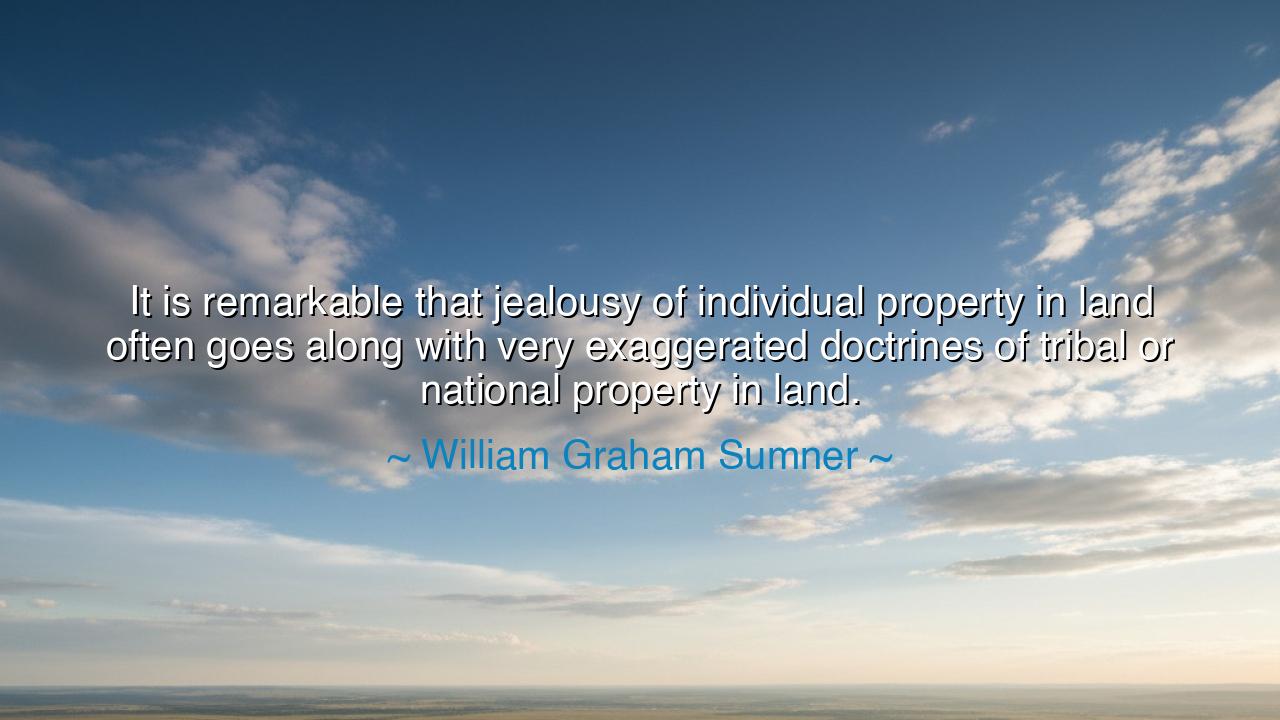
It is remarkable that jealousy of individual property in land
It is remarkable that jealousy of individual property in land often goes along with very exaggerated doctrines of tribal or national property in land.






The voice of William Graham Sumner, sharp and discerning, gives us this reflection: “It is remarkable that jealousy of individual property in land often goes along with very exaggerated doctrines of tribal or national property in land.” Here is a paradox unveiled—how men who scorn the idea of private ownership often cling with passion to the ownership of their tribe or nation. The same spirit that condemns one man for claiming a plot of soil will exalt a people for claiming vast dominions. This contradiction is not new, but ancient as humanity itself, and it speaks to the complexity of jealousy, pride, and the eternal struggle over land.
To understand these words, we must first see how deeply tied human identity is to the ground beneath our feet. A man may hesitate to allow his neighbor to hold a field as his own, fearing inequality or greed, yet he will fiercely defend the right of his people, his nation, to own mountains, rivers, and plains in common. Thus, what he denies to the individual, he grants to the collective. Sumner calls this out as remarkable not because it is rare, but because it is so universal, born of the mingling of fear, loyalty, and ambition.
The ancients themselves lived this tension. Among the tribes of Israel, land was seen not as the possession of one alone, but as the inheritance of a people, apportioned by God, defended with fervor, and restored each Jubilee year. To sell land permanently was forbidden, yet the entire nation laid claim to its territory against all outsiders. Likewise, the Greek city-states fought endlessly for patches of territory, each proclaiming the sacred right of the polis to hold land, while internally, disputes about private estates often stirred jealousy and rebellion. The struggle between the individual and the collective is as old as civilization.
History shows us the cost of this paradox. Consider the fate of the indigenous peoples of North America. Many of their leaders resisted the notion of private land ownership, for to them, the earth was a gift to the tribe, not to the individual. Yet when confronted by nations like Britain and later the United States—nations who exalted national ownership and enforced private property laws—they found themselves dispossessed. Their rejection of individual property made them vulnerable to a foreign system, while their reliance on tribal ownership could not withstand the rising doctrine of nations that claimed vast lands as their collective right. Their story reveals the peril Sumner warns of: that jealousy of individual property often blinds people to the dangers of exaggerated collective claims.
The meaning, then, is layered. On one hand, jealousy of private property may arise from a noble impulse, a desire to restrain greed and protect the many. Yet if this jealousy grows too great, it often leads to doctrines that glorify collective ownership in ways that are equally prone to abuse. For when tribes and nations exalt their exclusive rights to land, wars follow, boundaries are drawn in blood, and countless lives are sacrificed. The individual may oppress his neighbor with a fence, but the nation may oppress entire peoples with armies.
What lesson must we draw? That balance is wisdom. Neither blind worship of private ownership nor blind worship of collective ownership can secure justice. A society must temper its doctrines with humility, remembering that land itself outlives both individuals and nations. To despise the farmer for holding his field, yet to glorify the nation for seizing vast frontiers, is hypocrisy. True wisdom lies in stewardship: in holding land, whether as individual or nation, not as a weapon of jealousy, but as a trust for life and for future generations.
Therefore, O listener, take these words of Sumner as both warning and guidance. Guard against the jealousy that scorns the rights of individuals while exalting the ambitions of nations. See in the soil not merely property, but inheritance, gift, and responsibility. Act with fairness in small matters, lest you become blind in greater ones. And remember this eternal truth: the land belongs not only to us, but to those who came before and those who are yet to come. To hold it wisely is the truest defense, the noblest inheritance, and the only ownership that endures.






AAdministratorAdministrator
Welcome, honored guests. Please leave a comment, we will respond soon